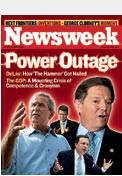Bubble? What Bubble?

Newsweek Magazine reporter Jane Bryant Quinn writes this week that, despite all this wind we've been blowing about a "housing bubble," the consumer data just does not indicate that such is the case. Ok, agree or disagree with that premise if you will, but my biggest beef with this story is David Lereah, who is so clearly full of hot air. He talks in this story about "rolling booms" and explains that it means home buyers will behave like nomads roaming the landscape looking for the cheap housing, with Californians cashing out and moving to Phoenix, for example. While there certainly are a lot of people who have done that (most of them seniors) I hardly see this as a trend. Aside from the job market in big states like California dwarfing that of cheaper, smaller states, Americans in general like to be near family, especially after retirement. Anyway, shame on me for letting emotions infect my argument. Here's an excerpt from the story via MSNBC:
Oct. 10, 2005 issue - It ain't over 'til it's over. Home buyers keep hitting real estate out of the park. The prices of existing homes rose in August at the fastest pace in a quarter century. New construction, sales of newly built homes and applications for new mortgage loans are running, routinely, at stratospheric levels. The Gulf Coast's horrific hurricane losses will scramble the numbers for a few months, but the national passion for real estate hasn't cooled. In fact, prices could jump in Dallas, Baton Rouge, Memphis, Birmingham and other cities where displaced families decide to settle.Read the entire story at this link.
How long will the price boom last? Until mortgage rates rise by enough to cap the offers that buyers can afford to make. Economist Mark Zandi of Economy.com thinks we're close. An increase of 0.5 percentage points, to a fixed rate of 6.5 percent, would slow price gains to a crawl and push home values down in some of the most frenzied cities, he says. Realtors report scattered price cuts on expensive homes and in the most speculative markets.
That doesn't mean prices will collapse. Where some economists see a housing bubble ready to burst, others see a soft landing—"like the air coming out of a balloon," says David Lereah, chief economist for the National Association of Realtors. In Zandi's forecast, a handful of markets face declines of 10 percent or more (southeast Florida, San Diego, Phoenix, Las Vegas and coastal New Jersey), with another two dozen falling by 5 percent. In Lereah's version, Las Vegas, Washington, D.C, and other hot spots will continue to see gains—even if modest ones—thanks to steady demand from new people moving in.
Today's unprecedented housing streak rests on some real-world fundamentals. Jobs are plentiful, immigration stokes demand, incomes are rising among the well-to-do (the ones who make pricey offers) and the boomer bulge is reaching 50 to 60—the age group that controls substantial wealth. Besides city condos and houses, they're looking for second homes, driving up prices for any lot with a water view larger than a puddle.
Lereah sees a world of "rolling booms," where people priced out of one city migrate to others—if not Miami, then Charleston, Pensacola or Virginia Beach. California retirees can cash out of ranch homes for a fortune and buy a McMansion in low-tax Arizona or Nevada. Real-estate investors have lasered in on Utah and Idaho. Realtor Mike McNamara in Coeur d'Alene, Idaho, says that Californians are buying waterfront properties sight unseen, as well as newly built starter homes to rent or resell.
— The Boy in the Big Housing Bubble




<< Home